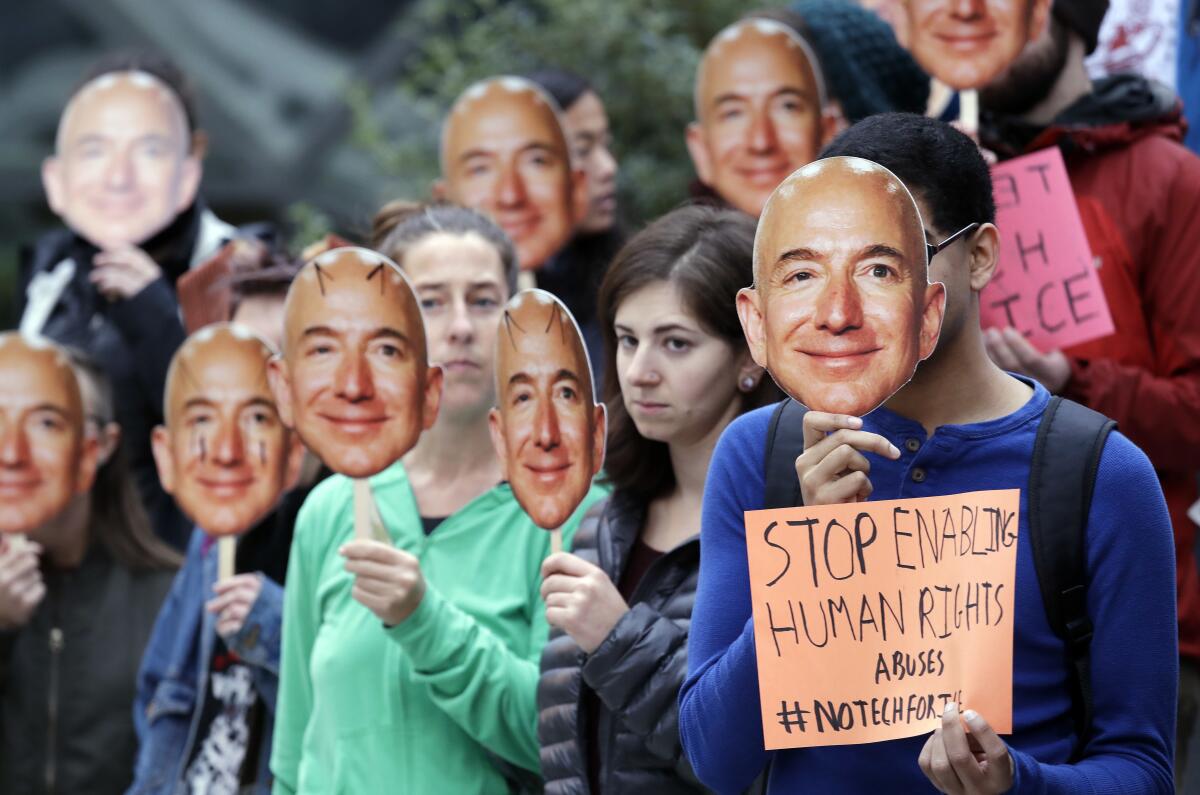Amazon pauses police use of its facial recognition software

- Share via
Answering widespread demands for new curbs on aggressive policing in the wake of George Floyd’s killing, Amazon is halting law enforcement use of its facial recognition platform for one year, the company said Wednesday.
The company has marketed its software platform, called Rekognition, to law enforcement agencies for years, and its short blog post announcing the shift did not provide an explicit reason for the change of direction. The post did note that Amazon supports federal regulation of facial recognition technology and that the company hopes the one-year moratorium “might give Congress enough time to implement appropriate rules.”
The move came two days after IBM announced that it was getting out of the facial recognition business entirely, citing ethical concerns over the powerful technology. In a letter to Congress, the company’s chief executive, Arvind Krishna, wrote that “IBM firmly opposes and will not condone uses of any [facial recognition] technology, including facial recognition technology offered by other vendors, for mass surveillance, racial profiling, violations of basic human rights and freedoms,” or any other purpose that goes against the company’s core principles.
Cities around the country, including Berkeley, Oakland and San Francisco, have banned the technology’s use by public agencies outright over fears that the software, which employs machine learning algorithms to automatically detect human faces in digital video and match them to names, presents too great a risk to privacy to be used responsibly.
A 2019 California law banned the use of facial recognition software — and any other biometric surveillance that can identify people by tattoo, gait or other individually distinguishable characteristics — on photos or video collected by law enforcement agencies.
Facial recognition’s first blanket ban arrived in May, when San Francisco became the only city in the nation to bar police and other agencies from using the technology.
The text of the law summarized the concerns about the use of the technology, calling its potential widespread application the “functional equivalent of requiring every person to show a personal photo identification card at all times in violation of recognized constitutional rights,” regardless of consent. It added that its use runs the risk of creating massive, unregulated databases about Californians never suspected of committing a crime, and “may chill the exercise of free speech in public places” as the identities of anyone in a crowd could be immediately discerned.
Amazon has been one of the leading providers of facial recognition technology to law enforcement agencies in recent years, a role that has drawn criticism. In June 2018, the Washington state branch of the American Civil Liberties Union called on the Seattle company to stop providing the technology to governments, including local law enforcement.
The Amazon executive who oversees Rekognition told reporters at PBS’ “Frontline” in February that the company did not know how many police departments used the technology. “We have 165 services in our technology infrastructure platform,” said Andrew Jassy, chief executive of Amazon Web Services, “and you can use them in any combination you want.”
Fight for the Future, a digital rights group that has been leading a coalition calling for an outright ban on facial recognition technology in all applications, said a one-year pause is not enough.
“This is nothing more than a public relations stunt from Amazon,” Evan Greer, deputy director at Fight for the Future, said in a statement. Greer said the appeal for federal regulation is consistent with a strategy — familiar from the fight over California’s landmark privacy law passed last year — in which powerful tech companies lobby for broad federal regulation that is ultimately weaker than state or municipal-level regulation of their business.







